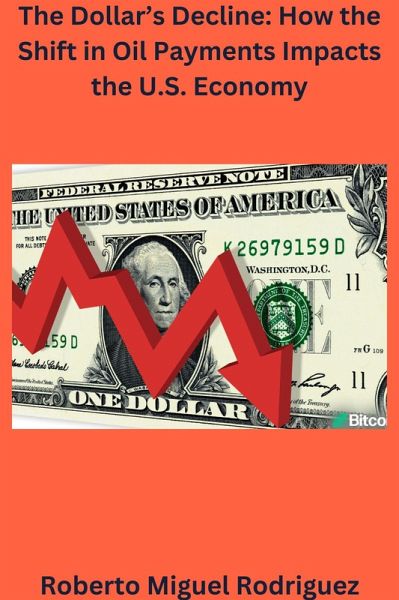
The Dollar's Decline: How the Shift in Oil Payments Impacts the U.S. Economy (eBook, ePUB)
Sofort per Download lieferbar
7,99 €
inkl. MwSt.

PAYBACK Punkte
0 °P sammeln!
"The Dollar's Decline" delves into the intricate relationship between the U.S. dollar, global oil transactions, and the broader health of the American economy. For decades, the dollar's status as the world's reserve currency, especially in oil trade, has been a cornerstone of its global economic influence. This comprehensive exploration examines the ramifications of a shift away from the dollar in oil transactions and what it portends for the future of U.S. economic dominance.Key aspects of the book include:Historical Context: An overview of the establishment of the U.S. dollar as the de facto...
"The Dollar's Decline" delves into the intricate relationship between the U.S. dollar, global oil transactions, and the broader health of the American economy. For decades, the dollar's status as the world's reserve currency, especially in oil trade, has been a cornerstone of its global economic influence. This comprehensive exploration examines the ramifications of a shift away from the dollar in oil transactions and what it portends for the future of U.S. economic dominance.
Key aspects of the book include:
Historical Context: An overview of the establishment of the U.S. dollar as the de facto currency for global oil transactions and the resulting 'petrodollar' system.
Economic Pillars: Unpacking the benefits accrued by the U.S. due to the dollar's dominant position in oil trade, from lower borrowing costs to heightened geopolitical leverage.
Emerging Trends: Analyzing the motivations and mechanisms through which countries are exploring alternatives to the dollar for oil trade, from bilateral agreements to the rise of other reserve currencies.
Impacts on the U.S. Economy: Investigating the potential economic consequences of a diminished role for the dollar, including effects on interest rates, trade balances, and foreign investment.
Global Ripple Effects: Exploring how changes in oil transaction dynamics could reverberate through global financial systems, trade alliances, and geopolitical strategies.
Future Forecasting: Speculation on the potential future of the U.S. dollar, considering technological innovations, emerging economic powers, and shifts in global economic governance.
Adaptive Strategies: Proposing potential policy adjustments, economic reforms, and strategic alliances the U.S. could pursue to mitigate risks and capitalize on new opportunities.
"The Dollar's Decline" serves as a timely primer for understanding the evolving landscape of global economic power dynamics. Through rigorous analysis, expert insights, and a forward-looking perspective, the book provides readers with a nuanced understanding of the potential challenges and transformations on the horizon for the U.S. economy in a rapidly changing global financial ecosystem.
Key aspects of the book include:
Historical Context: An overview of the establishment of the U.S. dollar as the de facto currency for global oil transactions and the resulting 'petrodollar' system.
Economic Pillars: Unpacking the benefits accrued by the U.S. due to the dollar's dominant position in oil trade, from lower borrowing costs to heightened geopolitical leverage.
Emerging Trends: Analyzing the motivations and mechanisms through which countries are exploring alternatives to the dollar for oil trade, from bilateral agreements to the rise of other reserve currencies.
Impacts on the U.S. Economy: Investigating the potential economic consequences of a diminished role for the dollar, including effects on interest rates, trade balances, and foreign investment.
Global Ripple Effects: Exploring how changes in oil transaction dynamics could reverberate through global financial systems, trade alliances, and geopolitical strategies.
Future Forecasting: Speculation on the potential future of the U.S. dollar, considering technological innovations, emerging economic powers, and shifts in global economic governance.
Adaptive Strategies: Proposing potential policy adjustments, economic reforms, and strategic alliances the U.S. could pursue to mitigate risks and capitalize on new opportunities.
"The Dollar's Decline" serves as a timely primer for understanding the evolving landscape of global economic power dynamics. Through rigorous analysis, expert insights, and a forward-looking perspective, the book provides readers with a nuanced understanding of the potential challenges and transformations on the horizon for the U.S. economy in a rapidly changing global financial ecosystem.
Dieser Download kann aus rechtlichen Gründen nur mit Rechnungsadresse in A, B, CY, CZ, D, DK, EW, E, FIN, F, GR, H, IRL, I, LT, L, LR, M, NL, PL, P, R, S, SLO, SK ausgeliefert werden.













